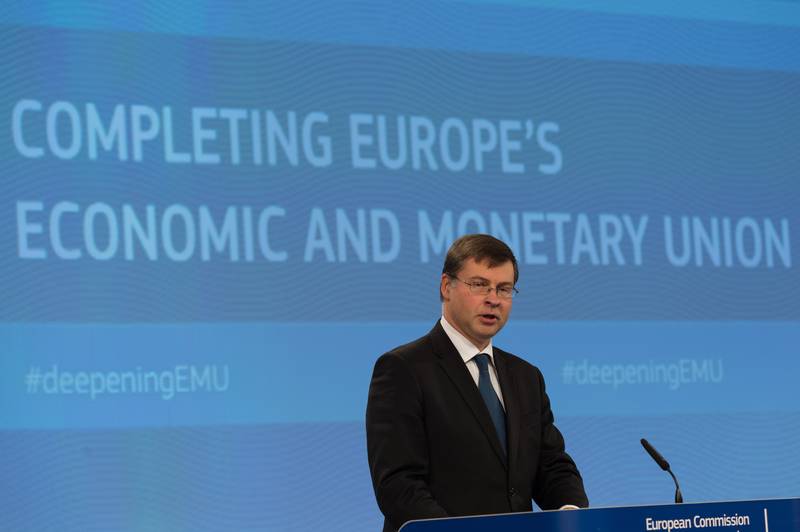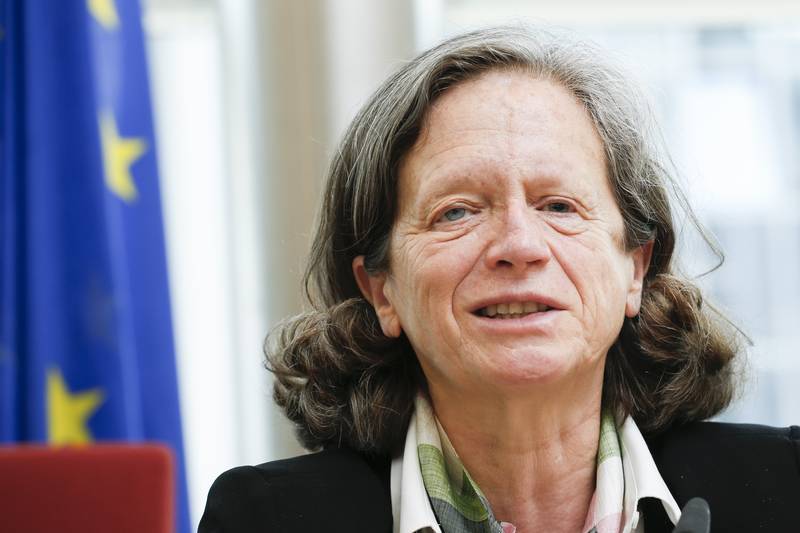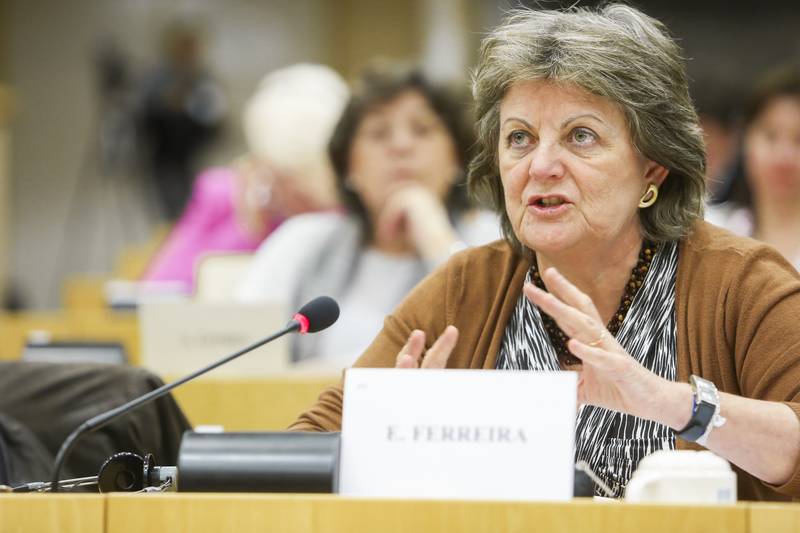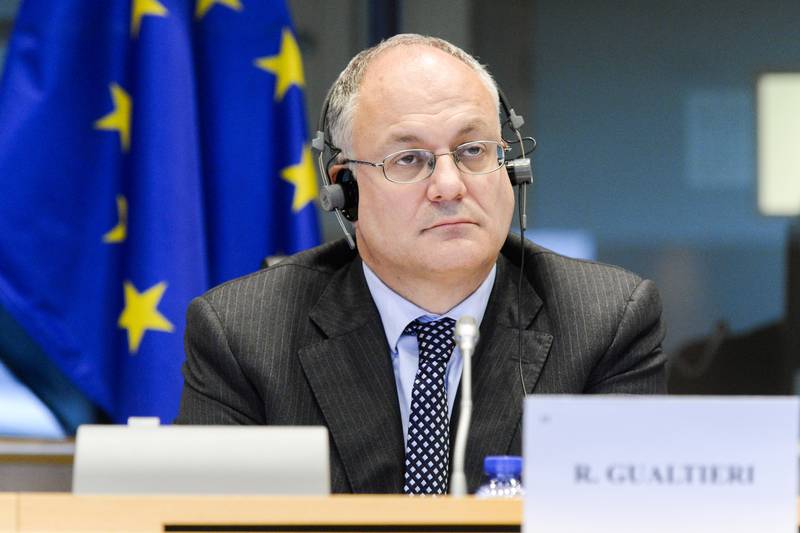EP and Commission in a Row over the Future of the Euro Area, Council Is Indifferent
Adelina Marini, October 24, 2015
 The long awaited concrete legislative proposals of the European Commission for deepening of integration in the euro area following the model, set in the five presidents’ report in June of this year, turned out to be nothing more than intentions for the EU to be buried by more paperwork in the form of analyses with no legal value. This, however, did not stop the European Parliament from reacting sharply that with its proposals of October 21st the Commission is attempting to bring the hard won role of the EP in the economic governance of the Union to a minimum. All this just a week after the leaders of the 28 member states showed clearly their unwillingness to work on the upgrade of the euro area framework at this stage.
The long awaited concrete legislative proposals of the European Commission for deepening of integration in the euro area following the model, set in the five presidents’ report in June of this year, turned out to be nothing more than intentions for the EU to be buried by more paperwork in the form of analyses with no legal value. This, however, did not stop the European Parliament from reacting sharply that with its proposals of October 21st the Commission is attempting to bring the hard won role of the EP in the economic governance of the Union to a minimum. All this just a week after the leaders of the 28 member states showed clearly their unwillingness to work on the upgrade of the euro area framework at this stage.
What does the Commission propose?
A major part of the vision of the leaders of the European Commission, European Council, Eurogroup, European Central Bank, and European Parliament was concentrated on what could be done without changing the founding treaties of the EU – the so called first stage. Considerable focus in the document given to the leaders at their June summit is placed on the full implementation of the already adopted secondary legislation and hard work on achieving economic convergence between member states sharing the single European currency. Economic convergence of the euro-states suffered considerably during the almost five-year long euro area crisis, in some cases literally erasing what was achieved over the decade before the crisis. Economic differences between countries in the currency club is the cause for the ongoing tension and weak growth in the club, as well as for the emergence of macroeconomic imbalances.
There is agreement among the five presidents that one of the main ways to deal with the task at hand is going back to the competitiveness issue and an adequate solution to it. Even before the start of the crisis low competitiveness was a major problem in relations between euro area states, which exacerbated significantly during the crisis. Over the last 3-4 years the level of competitiveness of all EU economies, not just the ones from the euro area, is being monitored through the European semester, which was created in the beginning of the crisis with the big reform of EU’s economic governance. Within the semester, the Commission, through its analytical departments, analyses the problems in every individual EU member state, but also in the euro area as a whole, and makes specific recommendations. There are punishments envisaged in the legislation for not sticking to the rules, although none have been levied so far – not because there is a lack of occasions for them, but for political reasons.
Apart from that, the Commission puts to analysis the draft budget plans of euro area states and also issues recommendations and can levy sanctions for not following those recommendations. Something that, too, never got used up until now and was even bypassed in the case of France in this year’s cycle. With the signing of the fiscal compact member states committed to establishing national fiscal bodies, which are to monitor the implementation of fiscal discipline independent of governments.
Now, the Commission is proposing the establishment of more systems for analyses and recommendations. The first one is a system of national bodies on competitiveness. Every member state is to establish such a body, which is to monitor the implementation of policies in the field of competitiveness. National boards will monitor competitiveness in the broadest sense, so that it includes not only the price aspect of it, but factors like productivity, skills, attractiveness of the business environment, innovations. Their task will be to “provide information and expertise” on wage-setting mechanisms without having real opportunity to set wages or interfere with the work of social partners. Faster growth of wages relative to productivity was one of the issues that the Commission has been warning of even before the crisis, and during the crisis wages had to be cut in the worse affected states to regain balance.

The boards will offer advice and set them in a wider context – the euro area and the EU. They will inform the Commission and member states of their findings and will publish annual reports. They will also consult governments on implementation of country-specific recommendations. If they wish so, countries outside the euro area are free to establish such bodies. They have to be fully independent. The Commission envisages them either as a separate institution, or as a part of existing bodies. Minimum requirements are independence from government, capacity for “high-quality economic analysis”, and lack of ideological or other biases. The Commission will play the middle man in the system by coordinating their work and exchanging views.
To guarantee their independence, in the draft decision of the EC, that has to be confirmed by the Council, member states are to provide the Competitiveness Boards with statutory regimes in national laws through regulations or binding administrative provisions. Member states are to establish these bodies up to six months after the adoption of the EC recommendation and a year after the adoption the EC is to prepare its first report on the work of these boards.
The EC, however, will not stay idle while member states are busy establishing the next national consulting body. It will also establish a consulting board, only regarding fiscal policy. Its goal will be to coordinate the work of national fiscal bodies. It, too, will be without any instruments. Its role will be to spread expertise on fiscal matters. The board will consist of five world-renown international experts, specialists on macroeconomics and practical budgeting. The experts will be appointed by the Commission after consultations with the ECB, the Eurogroup Working Group, and the national fiscal councils. The decision to establish the next board will come into force on November 1st. The EC claims that the European Fiscal Board will not duplicate the work of other analytic units under its supervision and that its work will be completely autonomous. It, too, will produce reports and recommendations.
Keeping in mind that the current Commission declared a course towards politicising and has so far been coping well, you could start to explain the need for a depoliticised analytical body, which will, however, possess no powers. The decisions whether a state has broken the rules or whether sanctions are to be levied will continue to be made by the EC.
Revamping the European semester
The thing that actually outraged the European Parliament is the strange proposal of the EC for a revamping of the European semester. Strange, because the EC continues to stand by its opinion of last year that the European semester does not need repairs, but at the same time one of the proposals of October 21st is for “A revamped European semester”. Practically, no new legislative measures are provisioned, just a reorganisation of the work on it. The (somewhat) new moment is that more attention is being paid to the euro area. At the moment, the Commission does have a standing specific recommendation, which applies to the entire euro area and follows its progress separately. The Wednesday proposal provides for the European semester starting first with the euro area before discussing the rest of the EU member states. This is to happen, according to the new calendar, by mid-January at the latest.
There are many more consultations with national authorities provided for, as well as on-site visits, the so called fact-finding missions, negotiations, and only then issuing of specific recommendations. The EC promises more dialogue with governments, parliaments, and social partners, as well as with the European Parliament. Immediately following the publishing of the proposals key members of the EP’s economic committee came out with an extremely strong reaction, with the exception of right-wing MEPs. According to one of the co-authors of the current economic governance of the EU and Rapporteur on some of the most important dossiers in the European Parliament Elisa Ferreira (Socialists and Democrats, Portugal), "It is appalling that the Commission has been completely unable to draw the lessons from the way the crisis was managed, particularly inside the Eurozone. There is no critical evaluation neither of the legal instruments created for the economic governance - 6 pack, 2 pack and fiscal compact - nor of the huge problem that was created by the handling of the crisis from the Community method approach to an intergovernmental setting based on the Eurogroup”.
 She is also outraged by the fact that the Commission is planning on changing the interpretation and the content of these instruments with no prior evaluation of what went wrong. Another member of the most powerful parliamentary committee, also a socialist, Pervenche Berès (France), thinks it is unacceptable that the EC with its new proposals is going to make it more difficult for the EP to influence the process of adopting recommendations for the euro area, since the timeframe is much shortened. “This cannot become a simple deal between Commission and Council!", she said. The boss of the economic committee Roberto Gualtieri (Italy) protested the lack of ambition in the EC’s proposals, having in mind the challenges that the euro area is facing. He also sees a circumvention of the European Parliament and a desire for an arrangement between Berlaymont and the Consilium.
She is also outraged by the fact that the Commission is planning on changing the interpretation and the content of these instruments with no prior evaluation of what went wrong. Another member of the most powerful parliamentary committee, also a socialist, Pervenche Berès (France), thinks it is unacceptable that the EC with its new proposals is going to make it more difficult for the EP to influence the process of adopting recommendations for the euro area, since the timeframe is much shortened. “This cannot become a simple deal between Commission and Council!", she said. The boss of the economic committee Roberto Gualtieri (Italy) protested the lack of ambition in the EC’s proposals, having in mind the challenges that the euro area is facing. He also sees a circumvention of the European Parliament and a desire for an arrangement between Berlaymont and the Consilium.
The leader of the EPP group, Manfred Weber, however, pointed out that there is no need for anything to be touched on the EU’s economic governance. All that is needed is for things already agreed on to be implemented. “It is the European Commission’s role to use and implement these rules. But it is first and foremost the duty of the Member States to do their job to ensure the Eurozone is strong: they must take the necessary measures to reform themselves and boost their competitiveness”, he thinks. On Thursday evening, after a meeting of the Conference of Presidents, EP president Martin Schulz (Socialists and Democrats, Germany) sent a letter to EC President Jean-Claude Juncker in which he expresses his resentment of the limited role of the European Parliament in the process. The biggest worry is connected to the European semester. “The Conference of Presidents is concerned by the fact that the changes to the structure of the European Semester will make Parliament's involvement even more difficult than is currently the case, in particular on the recommendations for the euro area, whereas the role for Council and the Eurogroup is strengthened”.
Martin Schulz, who is considered to be the fifth president, but is not a full co-author of the report on deepening the euro area, points out further that the EC’s proposal does not provide for consultations with the EP on the appointment of members of the European Fiscal Board. Mr Schulz urged the boss of the EC to review the package once more.
A single euro area representation in the IMF
This idea was first launched back in 1998, but has not been implemented to date. European Commission Vice-President in charge of the euro Valdis Dombrovskis (Latvia, EPP) stated at the presentation of the proposal that the EC is withdrawing the old one, regardless of it having no significant differences with the new. Word is of a three-step approach with a final goal of a single euro area representation in the IMF, without it meaning that the current euro area members will lose their seats in the Fund. The case is extremely complicated and difficult to carry out, for it does not depend only on the EU, where such a decision must be made at the full 28 member states level, but by a qualified majority. This would not be a problem, for the 19 of the euro area are almost sufficient. The tricky part is at the IMF level, where states are distributed in the so called constituencies. Euro area countries are spread out in a total of six constituencies.
According to the EC, euro area countries are currently holding between them 23% of the IMF shares, which is more than the 17.7% of the USA. The IMF Executive Board consists of 24 members with the EU members in it currently are Germany, France, and the United Kingdom. The goal is for a gradual reconstruction of the structure of the IMF to allow the formation of constituencies, made up entirely of EU members. The end goal is for the euro area waking up with its own seat in the IMF by the year 2025 with the boss of the Eurogroup representing it there. At the moment, this post is held by Dutch Minister of Finance Jeroen Dijsselbloem, who was re-elected in June for a second two-and-a-half year term. The EC believes that it is fitting that the euro area is represented in the Executive Board of the Fund by the executive director of the euro area constituency (one or two constituencies). So far it is unclear how is the IMF going to like the idea of a single euro area representation and an individual representation of some of the area’s members.
In its legislative proposal, the EC provides for a preliminary agreement on common positions of the euro area. Until the single IMF representation becomes fact, however, the EC proposes all positions to be agreed on beforehand in the Council and the Eurogroup. It is also proposed that the EU requests that the IMF grants observer status in the Executive Board of the Fund to the euro area. It is to be represented by one of the states, which is already in the executive board. This could only be France or Germany, for Great Britain is not a member of the euro area. Representation will have a two-and-a-half year term with the EC and the ECB needing to be able to sit in meetings as well and intervene when appropriate. In the qualifying process it is provided that all issues, regarding changes in the IMF be coordinated and pre-agreed on in the Council and the Eurogroup.
 The expansion of the euro area is an interesting issue, which makes the already difficult situation even harder. It is provided that each time a EU member state fulfils the requirements and accepts the common currency changes will be made to the IMF. Mr Dombrovskis could not answer the question why he thinks that this time the proposal will pass and why would large member states agree. Sylvie Goulard, a MEP from the group of Liberals in the EP (France), welcomed the idea of a single representation and underlined that this will strengthen considerably the role of the euro as an international reserve currency. The problem is that only countries can be members of the IMF. For the euro are to receive a single representation, major changes need to be done to the IMF rules. In his letter to Juncker, however, Martin Schulz expresses reserves towards the proposal that the euro area is represented in the IMF by the boss of the Eurogroup, for his “democratic accountability is very limited”.
The expansion of the euro area is an interesting issue, which makes the already difficult situation even harder. It is provided that each time a EU member state fulfils the requirements and accepts the common currency changes will be made to the IMF. Mr Dombrovskis could not answer the question why he thinks that this time the proposal will pass and why would large member states agree. Sylvie Goulard, a MEP from the group of Liberals in the EP (France), welcomed the idea of a single representation and underlined that this will strengthen considerably the role of the euro as an international reserve currency. The problem is that only countries can be members of the IMF. For the euro are to receive a single representation, major changes need to be done to the IMF rules. In his letter to Juncker, however, Martin Schulz expresses reserves towards the proposal that the euro area is represented in the IMF by the boss of the Eurogroup, for his “democratic accountability is very limited”.
A common deposit insurance scheme
Regardless of strong opposition in the Council, mainly from Germany, against the common deposit guarantee scheme, the EC did decide to present its ideas on the completion of the banking union. To avoid a premature common deposit guarantee scheme the EC proposes an intermediate version – a European Deposit Insurance Scheme. Its purpose is to provide additional financing when the national deposit guarantee schemes are unable to take on larger local shocks. Another goal is for the national schemes not to rely entirely on national governments, for the main idea of the banking union is to cut the “vicious link” between banks and public finances. The main argument in the proposal, however, is for the euro to be truly a European currency, the citizens’ money must be guarded at a European level.
A week before the Commission’s strains and the sharp reaction from Parliament member states demonstrated total indifference. During the regular October summit, at which the issue of the future of the euro area was supposed to be key, the leaders paid hardly any attention to it. Moreover, they struck out of the draft conclusions the sentence, which makes a commitment to completing the banking union and settled for the promise to come back to the subject at their summit in December.
Translated by Stanimir Stoev
 Angela Merkel, Emmanuel Macron | © Council of the EU
Angela Merkel, Emmanuel Macron | © Council of the EU Benoit Coeure | © Council of the EU
Benoit Coeure | © Council of the EU Pierre Moscovici | © Council of the EU
Pierre Moscovici | © Council of the EU